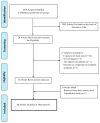Meat Consumption and Risk of Metabolic Syndrome: Results from the Korean Population and a Meta-Analysis of Observational Studies
- PMID: 29565803
- PMCID: PMC5946175
- DOI: 10.3390/nu10040390
Meat Consumption and Risk of Metabolic Syndrome: Results from the Korean Population and a Meta-Analysis of Observational Studies
Abstract
Many studies have reported harmful effects of red meat or processed meat on chronic diseases including cancer and diabetes, but epidemiological evidence for metabolic syndrome is limited and remains controversial. Therefore, we performed a meta-analysis of observational studies to assess the association between various meat consumption and risk of metabolic syndrome. The PubMed and ISI Web of Science databases were searched through June 2017, and further included unpublished results from Korea National Health and Nutrition Examination Survey 2012-2015, including 8387 Korean adults. Sixteen studies were suitable for meta-analysis, which included 19,579 cases among 76,111 participants. We used a random-effects model to calculate the pooled relative risks (RR) and 95% confidence intervals (CI). The pooled RR for metabolic syndrome of the highest versus lowest category of meat intake was 1.14 (95% CI: 1.05, 1.23) for total meat, 1.33 (95% CI: 1.01, 1.74) for red meat, 1.35 (95% CI: 1.18, 1.54) for processed meat, and 0.86 (95% CI: 0.76, 0.97) for white meat. All of these associations did not differ significantly by study design and adjustment factors. Our findings indicated that total, red, and processed meat intake is positively associated with metabolic syndrome, and white meat intake is inversely associated with metabolic syndrome.
Keywords: meta-analysis; metabolic syndrome; processed meat; red meat; white meat.
Conflict of interest statement
The authors declare no conflict of interest.
Figures





Similar articles
-
Effect of Red, Processed, and White Meat Consumption on the Risk of Gastric Cancer: An Overall and Dose⁻Response Meta-Analysis.Nutrients. 2019 Apr 11;11(4):826. doi: 10.3390/nu11040826. Nutrients. 2019. PMID: 30979076 Free PMC article. Review.
-
Red Meat Consumption and the Risk of Stroke: A Dose-Response Meta-analysis of Prospective Cohort Studies.J Stroke Cerebrovasc Dis. 2016 May;25(5):1177-1186. doi: 10.1016/j.jstrokecerebrovasdis.2016.01.040. Epub 2016 Feb 27. J Stroke Cerebrovasc Dis. 2016. PMID: 26935118 Review.
-
Dairy Consumption and Risk of Metabolic Syndrome: Results from Korean Population and Meta-Analysis.Nutrients. 2021 May 8;13(5):1574. doi: 10.3390/nu13051574. Nutrients. 2021. PMID: 34066690 Free PMC article.
-
Association between intake of red and processed meat and the risk of heart failure: a meta-analysis.BMC Public Health. 2019 Mar 29;19(1):354. doi: 10.1186/s12889-019-6653-0. BMC Public Health. 2019. PMID: 30922287 Free PMC article.
-
Replacing red meat and processed red meat for white meat, fish, legumes or eggs is associated with lower risk of incidence of metabolic syndrome.Clin Nutr. 2016 Dec;35(6):1442-1449. doi: 10.1016/j.clnu.2016.03.017. Epub 2016 Mar 31. Clin Nutr. 2016. PMID: 27087650
Cited by
-
Prevalence and Factors Associated with Metabolic Syndrome among Non-Diabetic Saudi Adults: A Cross-Sectional Study.Biomedicines. 2023 Dec 7;11(12):3242. doi: 10.3390/biomedicines11123242. Biomedicines. 2023. PMID: 38137464 Free PMC article.
-
Metabolic Syndrome and Coronary Artery Disease Risk: A Meta-Analysis of Observational Studies.Int J Environ Res Public Health. 2021 Feb 11;18(4):1773. doi: 10.3390/ijerph18041773. Int J Environ Res Public Health. 2021. PMID: 33670349 Free PMC article.
-
Combined Influence of Eight Lifestyle Factors on Metabolic Syndrome Incidence: A Prospective Cohort Study from the MECH-HK Study.Nutrients. 2024 Feb 16;16(4):547. doi: 10.3390/nu16040547. Nutrients. 2024. PMID: 38398871 Free PMC article.
-
The association between consumption of red and processed meats with metabolic syndrome and its components in obese and overweight women: a cross-sectional study.BMC Womens Health. 2024 Feb 6;24(1):93. doi: 10.1186/s12905-023-02862-7. BMC Womens Health. 2024. PMID: 38321426 Free PMC article.
-
Sociodemographic and lifestyle factors and the risk of metabolic syndrome in taxi drivers: A focus on street food.Front Nutr. 2023 Feb 23;10:1112975. doi: 10.3389/fnut.2023.1112975. eCollection 2023. Front Nutr. 2023. PMID: 36908907 Free PMC article.
References
-
- Alberti K.G., Eckel R.H., Grundy S.M., Zimmet P.Z., Cleeman J.I., Donato K.A., Fruchart J.C., James W.P., Loria C.M., Smith S.C., Jr., et al. Harmonizing the metabolic syndrome: A joint interim statement of the international diabetes federation task force on epidemiology and prevention; national heart, lung, and blood institute; American heart association; world heart federation; international atherosclerosis society; and international association for the study of obesity. Circulation. 2009;120:1640–1645. - PubMed
Publication types
MeSH terms
LinkOut - more resources
Full Text Sources
Other Literature Sources
Medical

